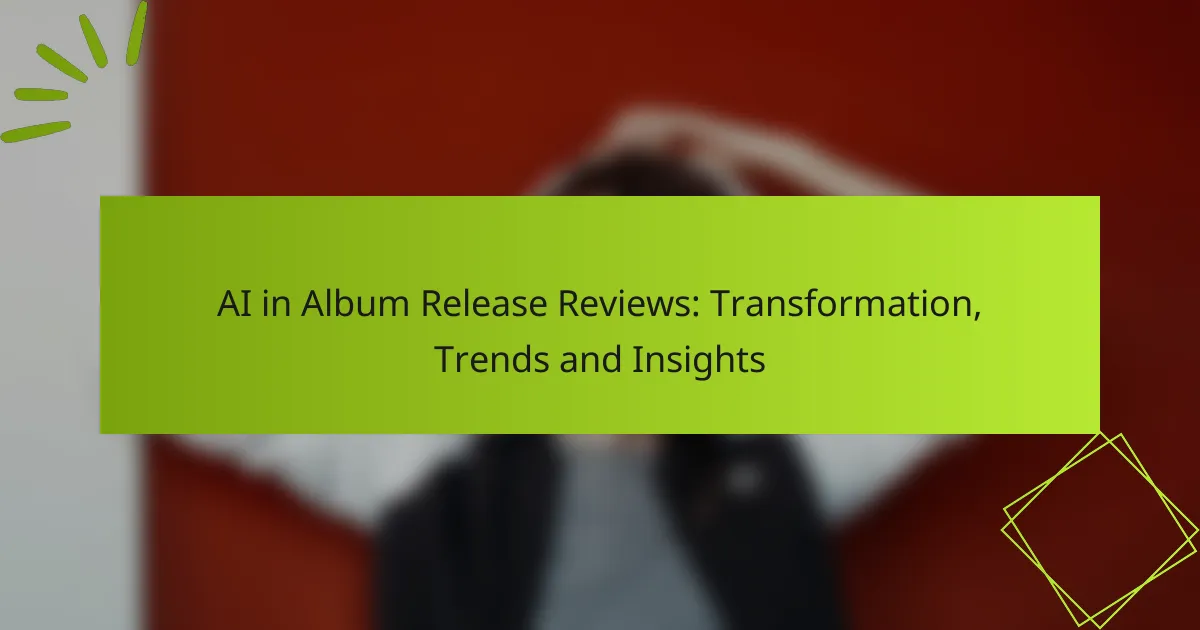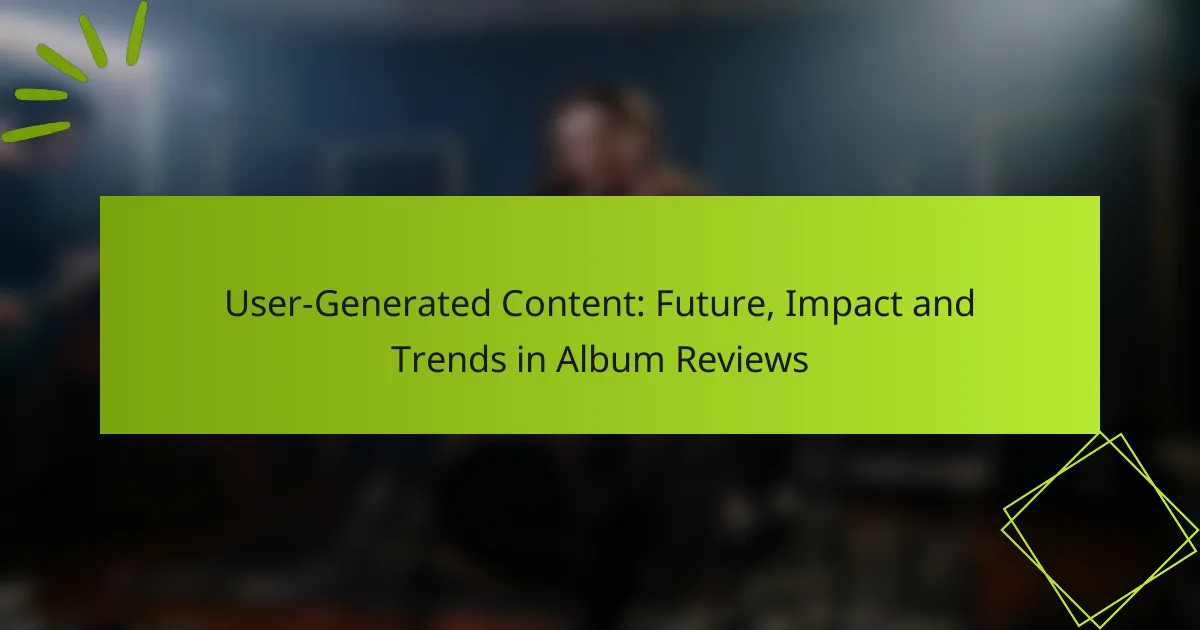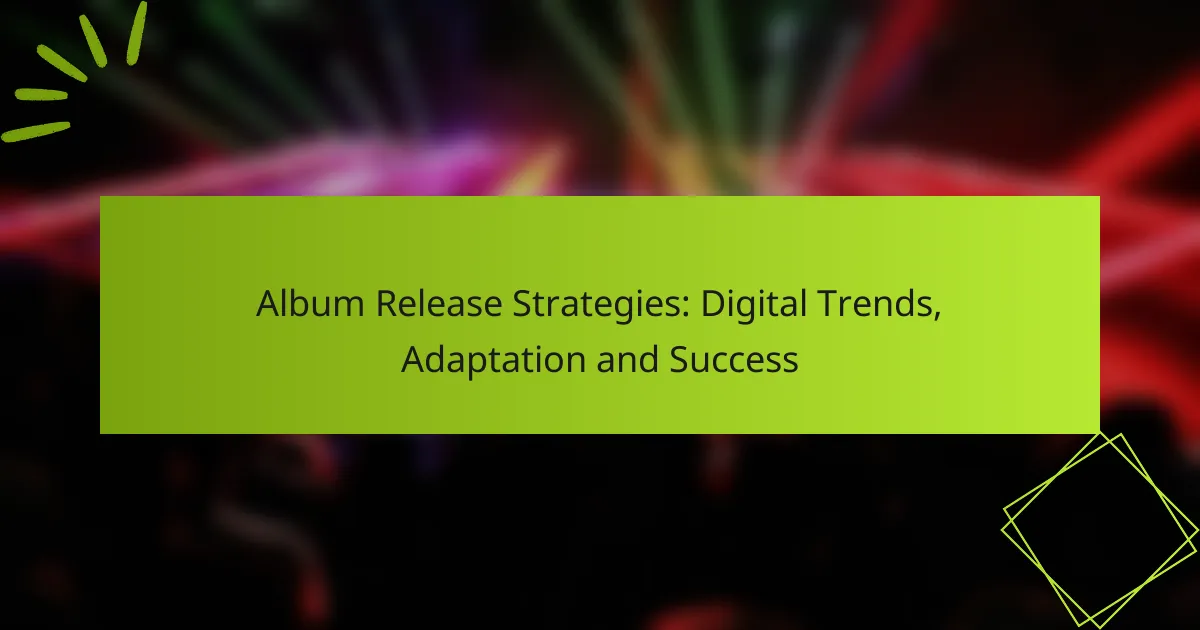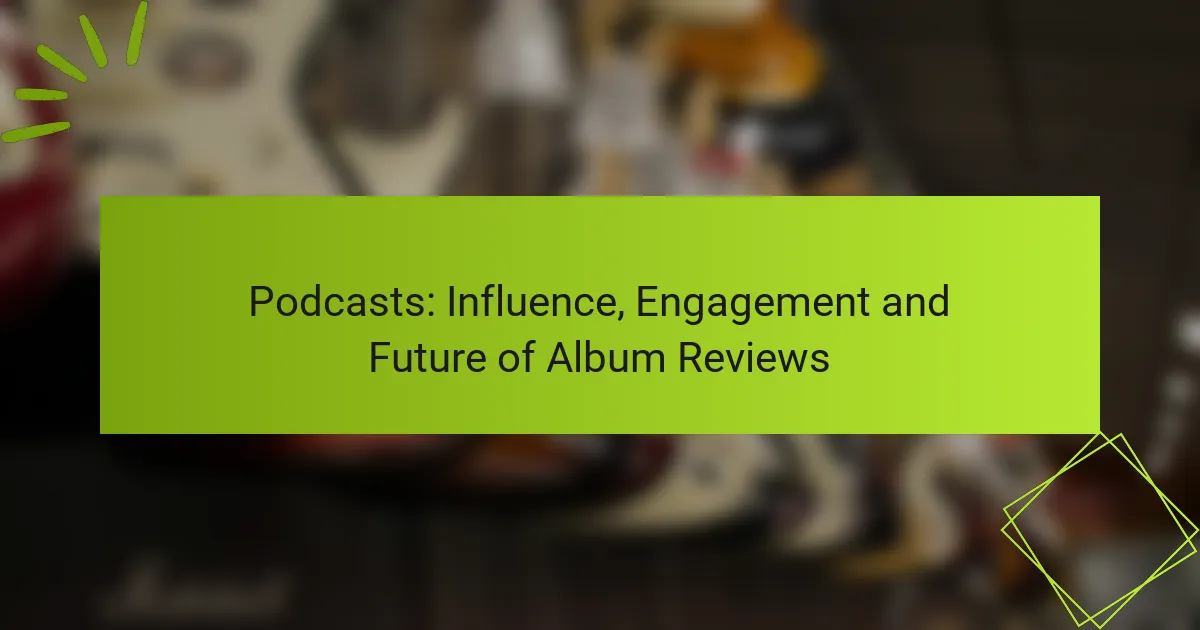AI is revolutionizing the landscape of album release reviews by streamlining the analysis process and offering valuable insights into listener preferences. With advancements in machine learning and natural language processing, reviews are becoming more efficient and nuanced, benefiting both artists and fans alike.
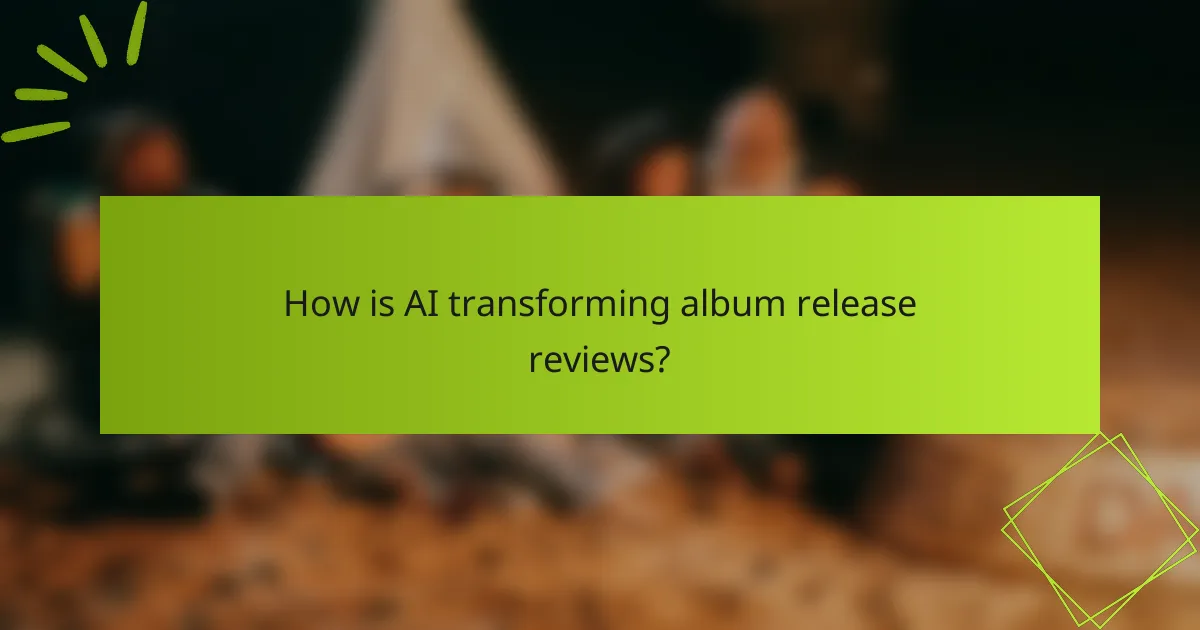
How is AI transforming album release reviews?
AI is significantly transforming album release reviews by automating analysis and providing deeper insights into listener preferences. This technology enhances the review process, making it faster and more data-driven, ultimately benefiting both artists and fans.
Automated sentiment analysis
Automated sentiment analysis uses AI algorithms to evaluate the emotional tone of reviews and listener feedback. By processing large volumes of text data from social media, blogs, and music platforms, AI can quickly determine whether sentiments are positive, negative, or neutral.
This technology allows record labels and artists to gauge public reaction almost in real-time, enabling them to adjust marketing strategies or engage with fans more effectively. However, it’s essential to ensure that the algorithms are trained on diverse datasets to avoid biases in sentiment interpretation.
Enhanced data-driven insights
AI provides enhanced data-driven insights by analyzing trends and patterns in listener behavior. By examining streaming data, social media interactions, and sales figures, AI can identify which elements of an album resonate most with audiences.
For example, AI can reveal that certain genres or themes are gaining popularity, helping artists tailor their future releases. This approach not only aids in marketing but also informs creative decisions, ensuring that artists remain relevant in a competitive market.
Personalized listener experiences
AI enables personalized listener experiences by curating content based on individual preferences. Streaming services use machine learning algorithms to recommend albums that align with a listener’s taste, enhancing user engagement.
For artists, understanding these preferences can inform promotional strategies, such as targeted advertising or exclusive content releases. However, it’s crucial to balance personalization with privacy, ensuring that user data is handled responsibly and transparently.
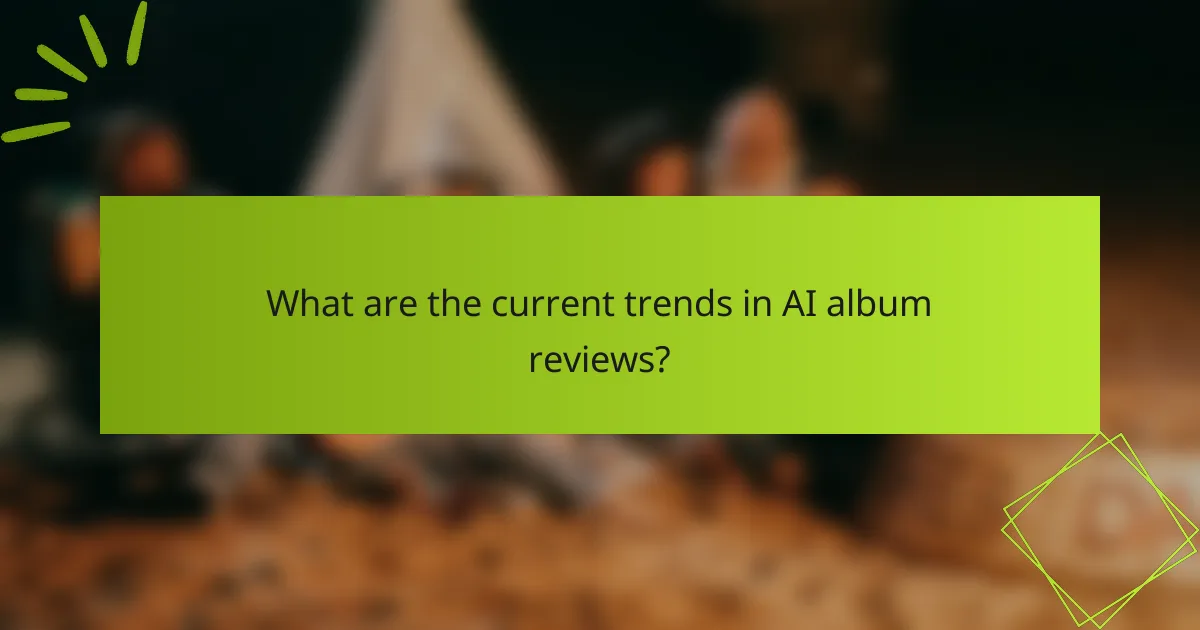
What are the current trends in AI album reviews?
Current trends in AI album reviews include the integration of advanced machine learning algorithms, the application of natural language processing, and the implementation of real-time feedback mechanisms. These innovations enhance the efficiency and accuracy of music critiques, allowing for more nuanced and timely insights into new releases.
Integration of machine learning algorithms
Machine learning algorithms are increasingly used to analyze vast amounts of data from music platforms and listener preferences. By identifying patterns in listener behavior and album characteristics, these algorithms can generate personalized reviews and recommendations. This trend allows for a more tailored listening experience, as AI can predict what users might enjoy based on their past interactions.
For example, platforms like Spotify and Apple Music utilize machine learning to curate playlists and suggest albums, which can influence the reviews generated by AI systems. However, it’s essential to ensure that these algorithms are trained on diverse datasets to avoid biases in music evaluation.
Use of natural language processing
Natural language processing (NLP) is a key component in the evolution of AI album reviews, enabling machines to understand and generate human-like text. NLP techniques allow AI to analyze lyrics, themes, and even the emotional tone of music, resulting in more insightful and relatable reviews. This capability helps bridge the gap between technical analysis and artistic interpretation.
AI tools employing NLP can summarize reviews, extract key sentiments, and even compare albums based on lyrical content. As a result, music critics and fans can access richer, more comprehensive insights that reflect both quantitative data and qualitative experiences.
Real-time feedback mechanisms
Real-time feedback mechanisms are transforming how album reviews are generated and consumed. AI systems can now analyze listener reactions immediately after an album’s release, providing insights that reflect current trends and audience sentiments. This immediacy allows for dynamic reviews that can evolve as more listeners engage with the music.
For instance, platforms may implement features that allow users to rate albums and provide comments instantly, which AI can then aggregate and analyze. This approach not only enhances the relevance of reviews but also fosters a more interactive relationship between artists and their audience, encouraging ongoing dialogue about new releases.
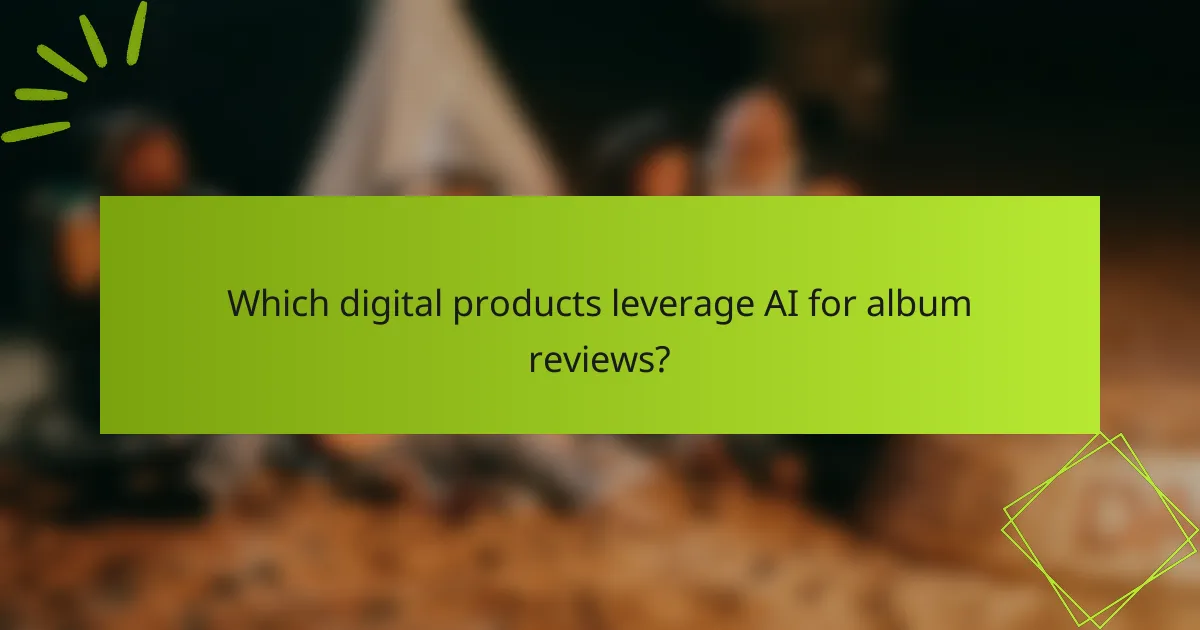
Which digital products leverage AI for album reviews?
Several digital platforms utilize AI to enhance album reviews, providing personalized experiences and insights. These products analyze user data and music trends to deliver tailored recommendations and reviews that resonate with listeners.
Spotify’s AI-driven playlists
Spotify employs AI algorithms to curate playlists based on user preferences and listening habits. By analyzing millions of tracks and user interactions, Spotify can generate playlists that include new album releases that align with a listener’s taste.
For instance, the “Discover Weekly” feature introduces users to new music every week, often highlighting recent albums that they might enjoy. This approach not only promotes new releases but also helps artists reach their target audience effectively.
Apple Music’s recommendation engine
Apple Music’s recommendation engine uses machine learning to suggest albums and tracks tailored to individual users. It considers factors like listening history, genre preferences, and even the time of day to provide relevant recommendations.
For example, if a user frequently listens to indie rock, the platform will prioritize new indie album releases in its suggestions. This targeted approach increases the likelihood of user engagement with new music and enhances the overall listening experience.
SoundCloud’s analytics tools
SoundCloud offers analytics tools that leverage AI to help artists understand listener engagement with their albums. These tools provide insights into which tracks are most popular, listener demographics, and geographic trends.
By utilizing these analytics, artists can make informed decisions about their marketing strategies and album releases. For instance, if a particular track from an album gains traction in a specific region, artists can focus their promotional efforts there to maximize impact.
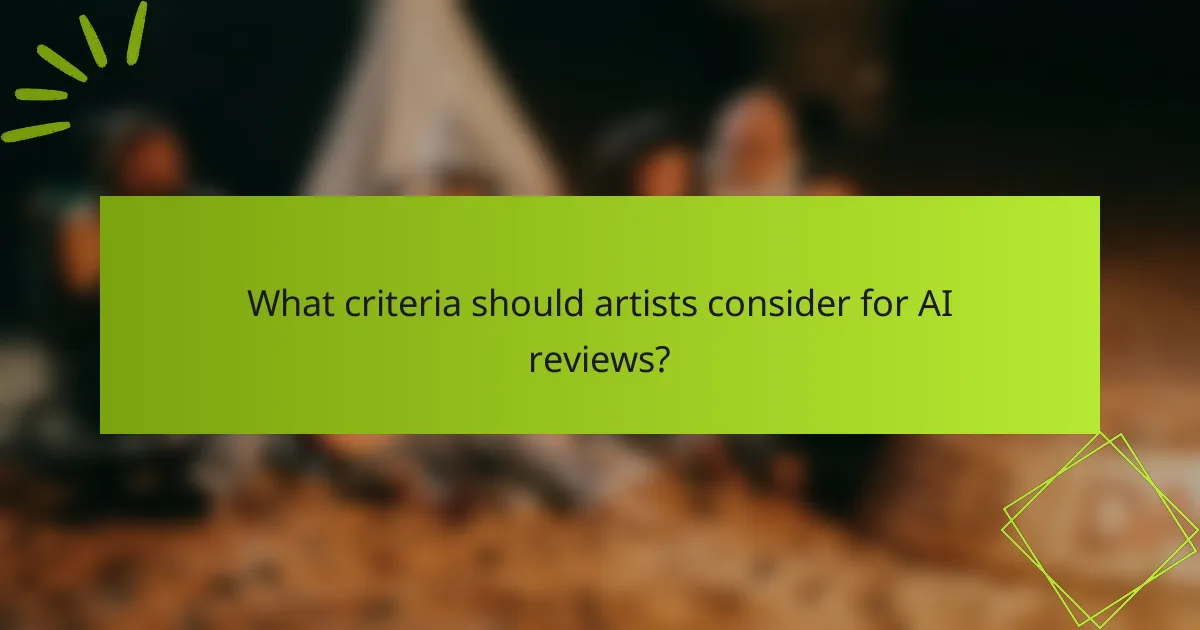
What criteria should artists consider for AI reviews?
Artists should focus on the quality of data inputs, target audience engagement, and platform compatibility when seeking AI reviews. These criteria significantly influence the effectiveness and relevance of the feedback generated by AI systems.
Quality of data inputs
The quality of data inputs is crucial for generating accurate AI reviews. Artists should ensure that the data fed into the AI system includes diverse and representative samples of their music, lyrics, and previous reviews. This helps the AI to better understand the nuances of their style and audience preferences.
Using high-quality audio files and well-structured metadata can enhance the AI’s ability to analyze and provide insightful feedback. For instance, including genre tags, release dates, and collaboration details can improve the contextual understanding of the music.
Target audience engagement
Understanding the target audience is essential for artists when utilizing AI reviews. Engaging with listeners through surveys or social media can provide valuable insights into what aspects of the music resonate most with them. This information can guide the AI in tailoring its reviews to reflect audience preferences.
Artists should consider segmenting their audience based on demographics or listening habits to refine the AI’s feedback further. For example, different age groups may have varying expectations regarding lyrical content or production quality.
Platform compatibility
Artists must evaluate the compatibility of AI review tools with their distribution platforms. Different platforms may have unique requirements or formats for music and metadata, which can affect how effectively the AI analyzes and reviews the work. Ensuring that the AI tool aligns with platforms like Spotify, Apple Music, or SoundCloud is vital.
Additionally, artists should consider the integration capabilities of AI tools with their existing workflows. Tools that offer seamless integration can save time and enhance the overall review process, allowing artists to focus more on creativity rather than logistics.
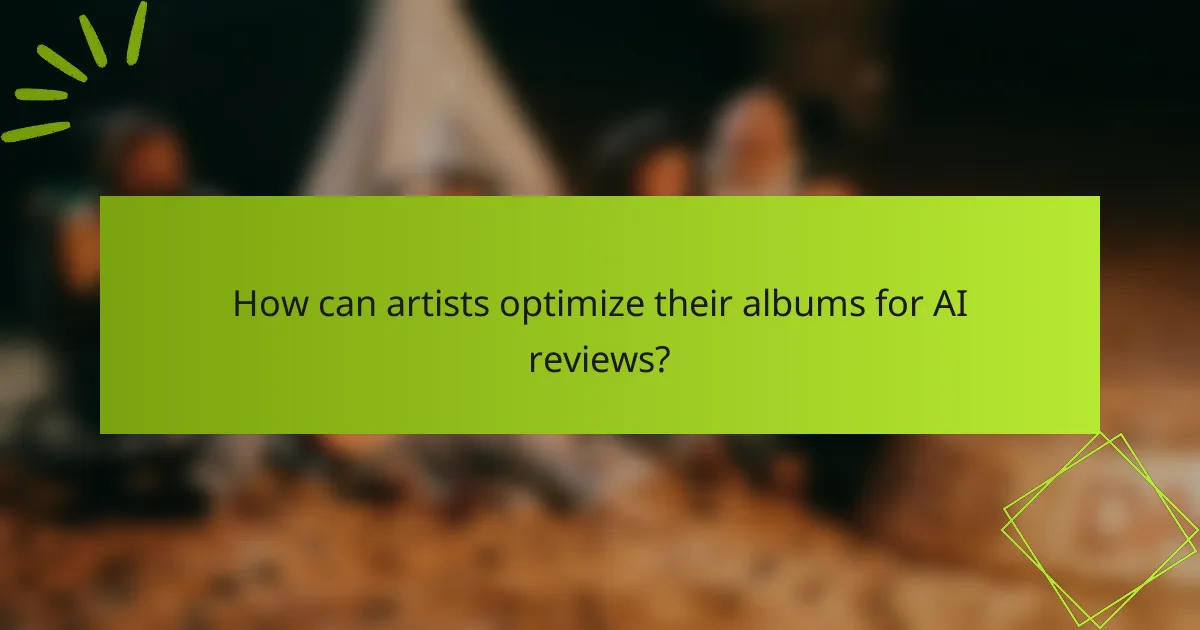
How can artists optimize their albums for AI reviews?
Artists can enhance their albums for AI reviews by focusing on effective metadata usage, leveraging AI-driven marketing tools, and collaborating with technology platforms. These strategies can significantly influence how AI systems analyze and rank their music.
Utilizing metadata effectively
Metadata plays a crucial role in how AI reviews interpret an album. Artists should ensure that all relevant information, such as genre, release date, and track details, is accurately tagged. This helps AI algorithms categorize and assess the music more effectively.
Including descriptive keywords in the metadata can enhance discoverability. For instance, using terms that reflect the album’s themes or emotions can improve its chances of being highlighted in AI-generated playlists or reviews.
Engaging with AI-driven marketing tools
AI-driven marketing tools can help artists reach their target audience more efficiently. By analyzing listener data, these tools can suggest optimal release times and promotional strategies tailored to specific demographics.
Artists should consider using platforms that offer AI analytics to track engagement and adjust their marketing efforts accordingly. For example, tools that analyze social media trends can guide artists in crafting messages that resonate with their audience.
Collaborating with tech platforms
Collaboration with tech platforms can provide artists with access to advanced AI features that enhance album visibility. Partnering with streaming services that utilize AI for recommendations can lead to increased exposure to potential listeners.
Artists should explore partnerships that allow for exclusive content or unique promotional opportunities, such as AI-generated music videos or personalized listening experiences. This not only boosts engagement but also aligns the artist with innovative technology trends.
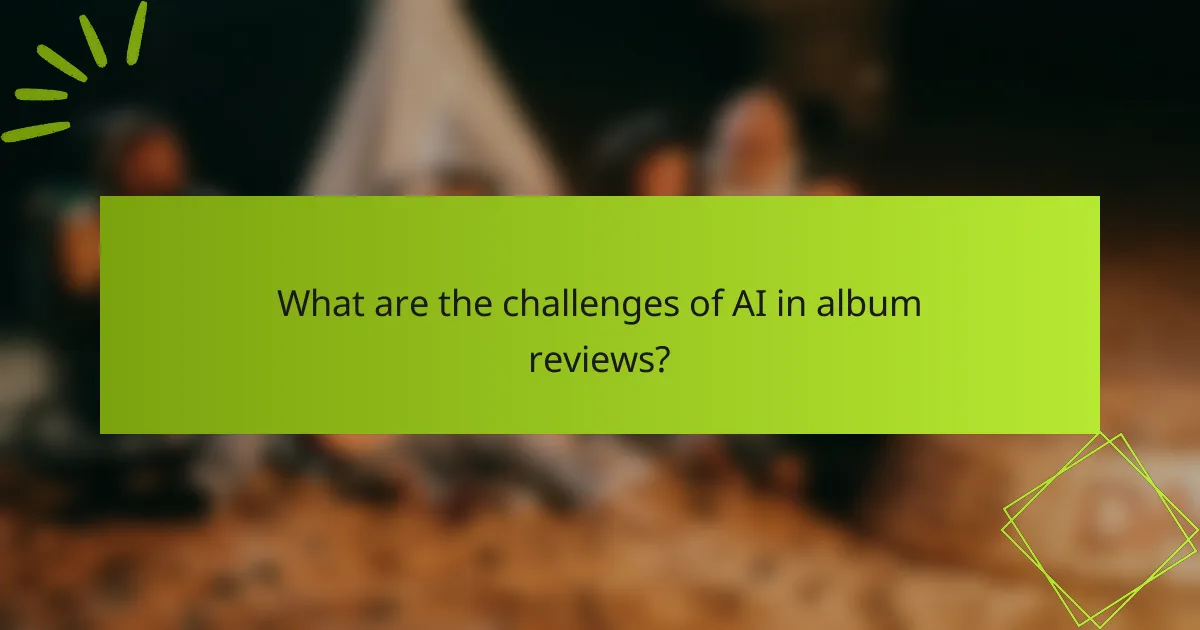
What are the challenges of AI in album reviews?
AI in album reviews faces several challenges, primarily related to bias in algorithms and data privacy concerns. These issues can significantly impact the quality and reliability of AI-generated reviews, making it essential to address them effectively.
Bias in AI algorithms
Bias in AI algorithms can lead to skewed album reviews that do not accurately reflect the music’s quality or the audience’s preferences. This bias often stems from the data used to train the models, which may overrepresent certain genres or demographics, resulting in a lack of diversity in the reviews.
To mitigate bias, developers should ensure that training datasets are comprehensive and representative of various musical styles and cultural backgrounds. Regular audits of AI outputs can help identify and correct biases, promoting fairness in album evaluations.
Data privacy concerns
Data privacy concerns arise when AI systems collect and analyze user data to generate personalized album reviews. Users may be hesitant to share their listening habits due to fears of data misuse or breaches, which can limit the effectiveness of AI in providing tailored recommendations.
To address these concerns, companies should implement robust data protection measures and be transparent about how user data is collected and used. Adhering to regulations such as GDPR can help build trust with users while ensuring compliance with privacy standards.
